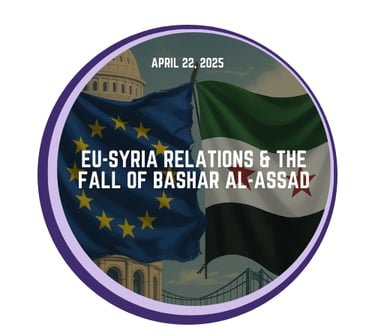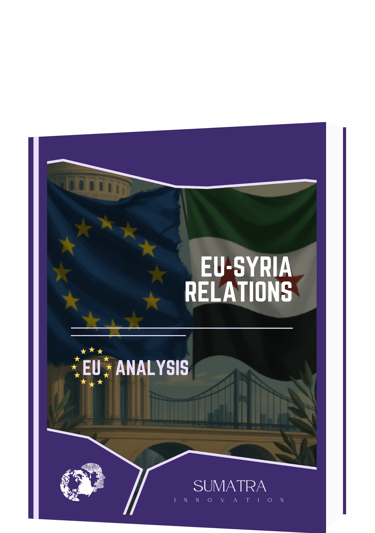Rethinking EU-Syria relations following the fall of Bashar al-Assad




The fall of Bashar al-Assad in December 2024 has reopened a critical chapter in Syria's political history, raising fundamental questions about the country's future and its place in the international system. This turning point invites the European Union to rethink its strategy toward Syria. As the country enters a new, yet uncertain, post-Assad era, the EU is faced with renewed challenges, but also potential opportunities, to play a constructive role in its reconstruction, both politically and materially.
In light of this major political shift, this article traces the evolution of EU-Syria relations, before, during, and after the Syrian conflict that erupted in 2011, from Hafez al-Assad's regime, to the country's alliances and rivalries, battleground for proxy wars and global power struggles. Subsequently, this article examines the EU's approach to Syria throughout the country's historical and geopolitical changing context. The complexity of these relations is explored through three key dimensions: diplomatic engagement in support of a political transition, security concerns (terrorism and migration), and humanitarian aid in response to one of the most devastating crises of the 21st century. By analysing these layers of engagement, this analysis sheds light on the dilemmas faced by the EU in balancing normative aspirations with geopolitical realities. And in a current post-conflict setting, the EU must now redefine and consider possible paths for renewed cooperation in a post-Assad Syria while remaining faithful to its principles and responsibilities on the global stage.



Executive Summary


Syria's foreign policy, based on the assertion of its national interests, has enabled the country to play a central role in the Middle East, notably through its strategic alliances, its support for Palestinian factions and its opposition to Israel, while navigating between confrontations and alliances to maintain its regional influence, despite growing isolation and internal tensions.
Syria has maintained an independent stance, supporting Hezbollah in Lebanon to preserve its regional influence, seeking to reclaim the Golan Heights from Israel, and maintaining a strategic alliance with Iran and Russia. This policy has led to its isolation on the international stage, creating tensions with certain Arab neighbors and Western powers.
The Syrian uprising of 2011, triggered by the inspiration of the Arab Spring, has its roots in the political repression of Bashar al-Assad's regime and in growing inequalities linked to liberal economic reforms favoring an elite close to power, to the detriment of the majority of the population.
The Syrian conflict is marked by deep divisions between sectarian, ethnic and ideological groups, exacerbated by the alignment of various groups with regional and international powers. This configuration has fragmented the opposition, making any reconciliation or political solution difficult.
The Syrian civil war has become a battleground for regional and international powers, exacerbating sectarian and ethnic divisions and turning the conflict into a proxy war. The divided international community has contributed to prolonging the conflict, intensifying humanitarian crises and destabilising the region.
The Syrian conflict, considered to be the worst modern catastrophe, has caused hundreds of thousands of deaths, displaced over 14 million people and left 70% of the population in need of humanitarian aid. Civilian infrastructures have been largely destroyed, limiting access to healthcare, education and basic services, exacerbating the suffering of millions of Syrians, especially children. Despite international efforts, the situation remains critical due to political and security obstacles, hampering the delivery of humanitarian aid.
Before 2011, relations between the European Union and Syria have evolved in contrasting directions, marked by attempts at rapprochement through economic and political agreements, but regularly held back by deep-seated differences over human rights, the situation in Lebanon and Syria's refusal to align itself with certain European demands.
Since 2011, the European Union has broken off diplomatic relations with the Syrian regime, condemning the repression and supporting a political transition via the Geneva negotiations. Its influence has remained limited by the absence of a coherent strategy, its internal divisions, the ineffectiveness of its policy of conditionality and its inability to exert real coercive power, illustrating the flaws of its foreign policy in the Syrian conflict.
The European Union imposed massive economic sanctions against the Syrian regime, with the aim of weakening Assad and bringing about political change; from 2014, with the rise of Daech, the EU's priority shifted to the fight against terrorism and regional stability, marking a shift from a normative approach to a security rationale.
The Syrian crisis triggered a mass exodus of refugees to Europe, testing the capacity of European countries to manage migratory flows. The European Union responded with significant humanitarian aid, refugee relocation initiatives and border control measures, while developing migration diplomacy, notably with Turkey, to manage the situation in a coordinated way and ensure a balance between humanitarian, security and domestic policy.




